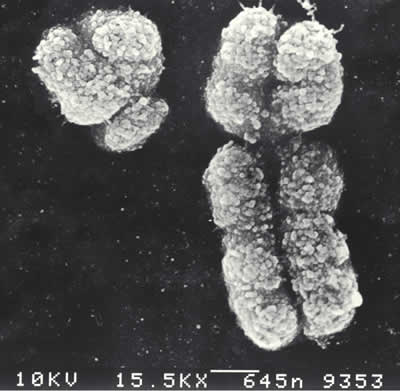Although deaths from heart disease are falling, it's still a major killer. And men are more likely to suffer coronary heart disease than women of the same age. This has often been put down to chaps having unhealthier lifestyles, but an international team by scientists in Leicester has just published a paper in the Lancet showing that there may actually be a genetic component at work.
Although men and women share almost all the same genes, there's one important difference. Women have two X chromosomes, while men have an X and a Y. There are only a handful of genes on the Y chromosome, making a grand total of around 27 proteins, and most of these are thought to be important for sexual development and making men manly.
 But in recent years, there have been some intriguing links made between this tiny genetic estate and diseases including HIV and autism. So the scientists decided to analyse the genetic makeup of the Y chromosome in more than 3000 British men involved in three different heart disease studies.
But in recent years, there have been some intriguing links made between this tiny genetic estate and diseases including HIV and autism. So the scientists decided to analyse the genetic makeup of the Y chromosome in more than 3000 British men involved in three different heart disease studies.
Because Y chromosomes are passed down almost whole from fathers to sons, with little genetic muddling from generation to generation, there are only a limited number of different 'flavours', or haplogroups of Y chromosomes. Because of this, the Y chromosome is often left out of most large-scale genetic studies looking for links between gene variations and diseases.
In this case, the researchers found that all the men fell into just 9 haplogroups, and 90 per cent of the Y chromosomes came from only two different haplogroups. And when they looked at their history of heart disease, they found that men with Y chromosomes from one particular haplogroup had a 50 per cent increased risk of developing coronary heart disease than men whose Y chromosome came from the other haplogroups.
After a bit more digging, the researchers confirmed that this association wasn't linked to other risk factors for heart disease, such as lifestyle factors like drinking and smoking or other known biological risk factors. And when they looked closer at the activity patterns of genes in men from different haplogroups, they found clear differences between those from the high risk group and the other groups in the activity levels of certain genes involved in inflammation and autoimmune responses, both of which are thought to play an important role in heart disease.
At the moment this is still just an association - although it's the first study to robustly uncover an association between heart disease and the Y chromosome - and a lot more work needs to be done to confirm this finding and figure out exactly how the genes on the Y chromosome are having these effects. But in the future it might help to lead to new ways to reduce the risk of heart disease in men, or even potentially treat the disease. And because the Y chromosome is passed down wholesale from father to son, it also tells us that in some cases, susceptibility to heart disease may be handed down the generations in this way.









Comments
Add a comment